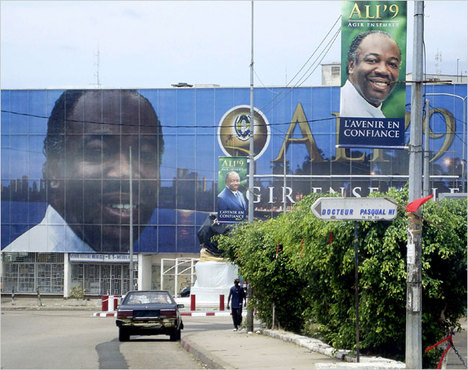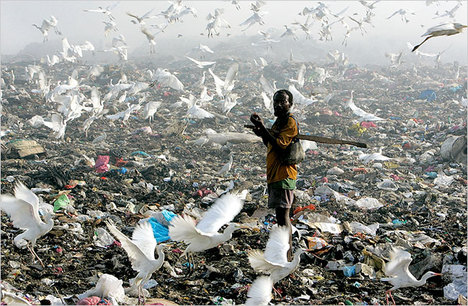 “The image of Ali Bongo, the son of longtime ruler Omar Bongo, blanketed Libreville.” Source of caption and photo: online version of the NYT article quoted and cited below.
“The image of Ali Bongo, the son of longtime ruler Omar Bongo, blanketed Libreville.” Source of caption and photo: online version of the NYT article quoted and cited below.
(p. A5) The “Bongo system,” as people here refer to it — forsaking roads, schools and hospitals for the sake of Mr. Bongo’s 66 bank accounts, 183 cars, 39 luxury properties in France and grandiose government constructions in Libreville — is etched in the streets of this languid seaside capital, where he ruled for 41 years, and also in the minds of its inhabitants.
. . .
A Western family here spoke of embarrassment at visiting a government minister whose house is packed with the latest flat-screen televisions and other expensive electronic gadgets, and whose garage was full of luxury cars. The top aide to a leading opposition figure, discussing the “Bongo system,” said: “You had to bring a suitcase to the palace. Bongo didn’t write checks.” The president, he said, “calls everybody to the palace, and the money is handed out. That’s how the country was run.”
He spoke of a “sandwich system” of vote-buying employed by the ruling party in rural districts: notables are called together for a meeting, and at the end, when all are tired, a tray of “sandwiches” is passed around. Inside each “sandwich” is up to $600.
Looking around at an outdoor restaurant, he asked not to be named because he said: “It’s a police state. They mess up your life.”
. . .
On paper, the government’s budget allocations for health, education and transportation were impressive, “huge,” said the Western development official. “But in reality, it was actually about 20 percent of what was on paper,” the official said. “The rest was embezzled,” he added, asking to remain anonymous because identifying him would complicate his work in the country.
. . .
“It’s a tiny number that benefits from the country’s riches,” said a cigarette vendor, Price Nyamam, squatting on the pavement in the poor Rio district. He said he had degrees in economics and sociology. “You are obliged to do work that doesn’t correspond to your aspirations.”
For the full story, see:
ADAM NOSSITER. “Libreville Journal; Underneath Palatial Skin, Corruption Rules Gabon.” The New York Times (Tues., September 15, 2009): A5.
(Note: the online version of the article has the date September 14, 2009.)
(Note: ellipses added.)
 “Foraging for food at the main dump.” Source of caption and photo: online version of the NYT article quoted and cited above.
“Foraging for food at the main dump.” Source of caption and photo: online version of the NYT article quoted and cited above.
